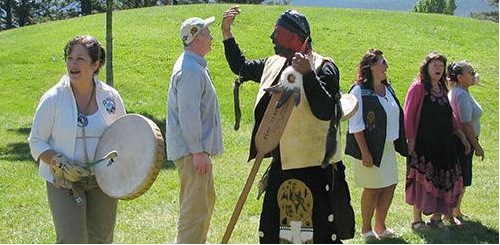“The Panel is convinced that the Tsilhqot’in cultural attachment to Fish Lake (Teztan Biny) and the Nabas areas is so profound that they cannot reasonably be expected to accept the conversion of that area into the proposed New Prosperity mine.” – Report of the Federal Environmental Review panel that led to the 2014 rejection of the proposed “New Prosperity Mine”
Amnesty International stands with the Tsilhqot’in people in calling on the BC government to immediately rescind work permits that would allow destructive mineral exploration activities in the vitally important Teztan Biny (Fish Lake) and Nabas areas.
“Some development projects are simply too destructive to be allowed to proceed and this is one of them,” said Craig Benjamin of Amnesty International Canada. ”The federal government has already twice rejected plans to mine in the Teztan Biny area. The last environmental assessment rightly found that the Tsilhqot’in have a right to be heard when they say that the area should be protected. To allow destruction of the territory for the purpose of a proposal that has already been rejected by the Federal Government demonstrates blatant disregard for Indigenous rights and highlights fundamental flaws at the heart of the BC regulatory process.”
The Tsilhqot’in people have decisively rejected plans to develop an open-pit gold and copper mine on the traditional territories near Teztan Biny. The Tsilhqot’in have been working toward establishing a Tribal Park in the area. See their press release here.
In separate decisions in 2010 and 2014, the federal government rejected mining near Teztan Biny based on environmental reviews that found that the various proposals for developing the Prosperity or New Prosperity gold-copper mine would case extensive harm to the natural environment and the Tsilhqot’in peoples’ use of vitally important cultural sites.
Despite this, the previous BC provincial government supported the mining company’s efforts to conduct work aimed at supporting the development of the already-rejected New Prosperity proposal. In the final days before the new provincial government took power, the previous government issued work permits for extensive development activities near Teztan Biny, including construction of 76 km of road and trail, 20 km of seismic lines and opening 122 drill holes and 367 test excavations. The fact that this mine was already rejected in 2014 did not prevent the BC government from authorizing this invasive activity on Tsilhqot’in territory.
International law, and key Canadian court decisions interpreting the Constitutional protection of Indigenous rights, affirm that all governments have a duty to protect the cultures and traditional practices of Indigenous peoples and, where decisions have the potential for serious harm, to proceed only with free, prior and informed consent.
The new provincial government in BC has committed to uphold the UN Declaration on the Rights of Indigenous Peoples and the Supreme Court decision on Tsilhqot’in land rights.
“The new provincial government has inherited a wide range of Indigenous rights concerns that it must now act quickly to resolve,” said Craig Benjamin. “Rescinding permits for the unwanted and unwarranted destruction of Tsilhqot’in territory should be one of the first steps it takes to uphold its promise to respect Indigenous rights.”
For more information, please contact Craig Benjamin, Amnesty International Canada Campaigner for Human Rights of Indigenous Peoples, at 613-744-7667, ext. 235






















